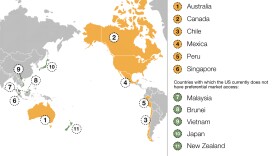By James LaValle
http://stream.publicbroadcasting.net/production/mp3/wkms/local-wkms-769613.mp3
Murray, KY – To begin, I remain in complete accord with the intentions, goals and ideals of MSU, especially with respect to the critical matter of discrimination. Similarly, I signed the general petition to incorporate sexual orientation into the present anti-discrimination policy enthusiastically. Thus, my concern is not with the motivations or objectives of those who worked to develop and institute this policy - I presently support those same goals and objectives, just as I have in the past. It is with the language that now articulates the policy, and also the ambiguity that defines it that I take issue, not with any wing, group, organization or person affiliated with MSU in any way, shape or form.
The language of the policy borrows terms from a discursive glossary of political euphemisms such as intolerance and contempt, to then-by logical extension - define discrimination as a probable combination of intolerance and contempt on the part of one towards another. The problem is not necessarily that these proxies are asserted, but rather that they are laid out in such a fashion as to easily allow some to perhaps insert tactically their own definitions while simultaneously dismissing or disparaging others.
At best, the policy only loosely defines intolerance as an attitude, feeling or belief wherein an individual expresses contempt for another individual based on such characteristics such as race, color, national origin, gender, sexual orientation or political or religious belief, but the policy leaves to the subjective imagination just what is meant by intolerance and contempt. When and how, for example, do competing social, intellectual or even religious discourses become contemptuous ?? And if two parties are both voluntarily participating in a particular debate equally, which is simply exercising their right to free speech, for example and which is acting contemptuous and intolerant according to University Policy?? Even more troublesome is that the evident focus on attitudes feelings and beliefs would seem to suggest that MSU looks not only to regulate actions and behaviors as it SHOULD, but also what others should think, feel and believe, which it SHOULDN'T.
Almost by logical extension, then, it is difficult to read the policy without forming intuitively the impression that interpretations and applications of the policy are most likely to be defined by boarder social groupings and classifications, rather than the unique conditions and situations that inevitably mark the distinctiveness of relevant occasions. In other words, if, say, an individual who just happens to belong to a particular social grouping takes a particular position on a critical matter, it seems to me that such an individual would then be more likely to be labeled intolerant or contemptuous than another individual who perhaps belongs to a different social grouping, and therefore holds a conflicting position. To be sure, we all agree that discrimination is unacceptable in the University, but perhaps we should take special care to be absolutely certain that our attempts to eradicate discrimination do not problematically and unjustly supplant one sort of discrimination for another.
Many who know me beyond just name or face recognition have variously described me as impassioned, impetuous, and intense, especially my professional superiors, a few of whom described me precisely in these terms at a moment when they were angry with me. But my present commentary is not borne of such things but out of an authentic concern over the possibility that MSU may head down a path with which I am all too familiar from another place and another time. I've visited this place before, many times, and it's not a good place to be.




